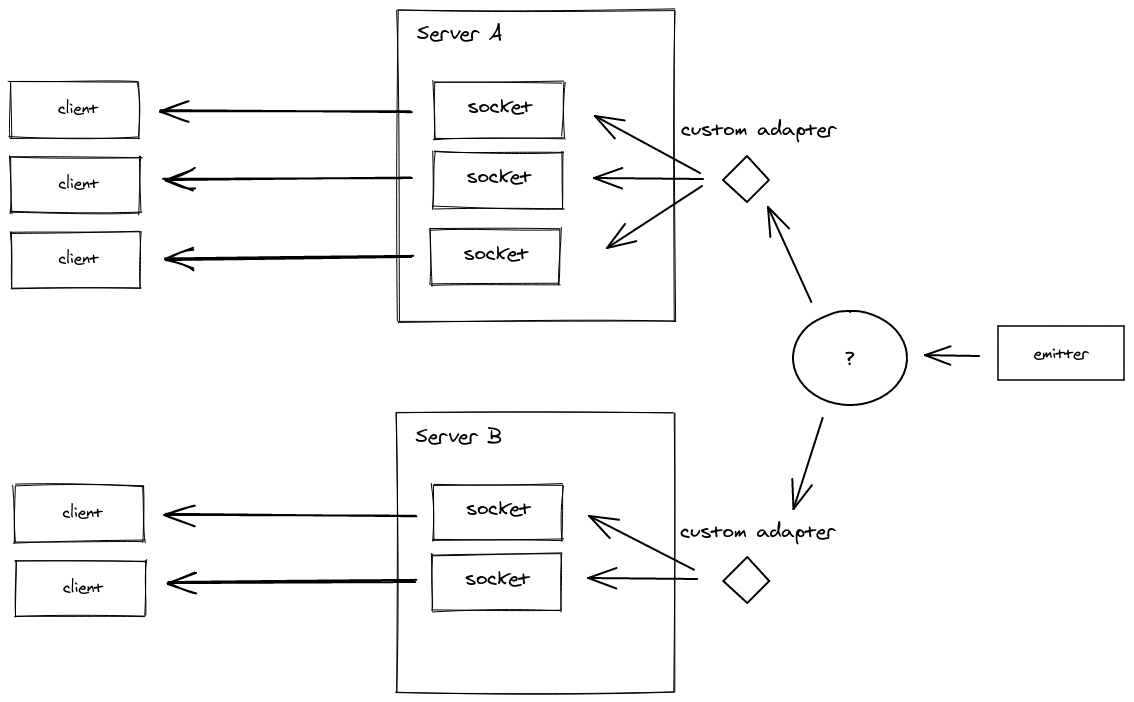适配器
适配器是一个服务器端组件,负责将事件广播到所有或部分客户端。
当扩展到多个 Socket.IO 服务器时,您需要将默认的内存适配器替换为另一个实现,以便将事件正确路由到所有客户端。
除了内存适配器之外,还有四种官方实现:
- the Redis 适配器
- the MongoDB 适配器
- the Postgres 适配器
- the Cluster 适配器
(真棒!)社区还维护了其他几个选项:
请注意,当使用多个 Socket.IO 服务器和 HTTP 长轮询时,仍然需要启用粘性会话。更多信息在这里.
API
您可以通过以下方式访问适配器实例:
// main namespace
const mainAdapter = io.of("/").adapter; // WARNING! io.adapter() will not work
// custom namespace
const adminAdapter = io.of("/admin").adapter;
从socket.io@3.1.0开始,每个 Adapter 实例都会发出以下事件:
create-room(argument: room)delete-room(argument: room)join-room(argument: room, id)leave-room(argument: room, id)
例子:
io.of("/").adapter.on("create-room", (room) => {
console.log(`room ${room} was created`);
});
io.of("/").adapter.on("join-room", (room, id) => {
console.log(`socket ${id} has joined room ${room}`);
});
Emitter
大多数适配器实现都带有相关的发射器包,它允许从另一个 Node.js 进程与一组 Socket.IO 服务器进行通信。

例如,这在微服务设置中可能很有用,其中所有客户端都连接到微服务 M1,而微服务 M2 使用发射器来广播数据包(单向通信)。
Emitter cheatsheet
// to all clients
emitter.emit(/* ... */);
// to all clients in "room1"
emitter.to("room1").emit(/* ... */);
// to all clients in "room1" except those in "room2"
emitter.to("room1").except("room2").emit(/* ... */);
const adminEmitter = emitter.of("/admin");
// to all clients in the "admin" namespace
adminEmitter.emit(/* ... */);
// to all clients in the "admin" namespace and in the "room1" room
adminEmitter.to("room1").emit(/* ... */);
The emitter also supports the utility methods that were added in socket.io@4.0.0:
socketsJoin()
// make all Socket instances join the "room1" room
emitter.socketsJoin("room1");
// make all Socket instances of the "admin" namespace in the "room1" room join the "room2" room
emitter.of("/admin").in("room1").socketsJoin("room2");
socketsLeave()
// make all Socket instances leave the "room1" room
emitter.socketsLeave("room1");
// make all Socket instances in the "room1" room leave the "room2" and "room3" rooms
emitter.in("room1").socketsLeave(["room2", "room3"]);
// make all Socket instances in the "room1" room of the "admin" namespace leave the "room2" room
emitter.of("/admin").in("room1").socketsLeave("room2");
disconnectSockets()
// make all Socket instances disconnect
emitter.disconnectSockets();
// make all Socket instances in the "room1" room disconnect (and discard the low-level connection)
emitter.in("room1").disconnectSockets(true);
// make all Socket instances in the "room1" room of the "admin" namespace disconnect
emitter.of("/admin").in("room1").disconnectSockets();
// this also works with a single socket ID
emitter.of("/admin").in(theSocketId).disconnectSockets();
serverSideEmit()
// emit an event to all the Socket.IO servers of the cluster
emitter.serverSideEmit("hello", "world");
// Socket.IO server (server-side)
io.on("hello", (arg) => {
console.log(arg); // prints "world"
});